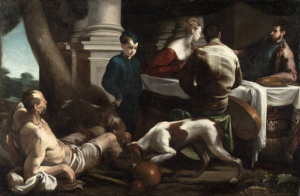Thoughts on Sunday’s Lessons for Sept. 29, 2019
First Reading (Track One): Jeremiah 32:1-3a, 6-15
Imagine yourself living amid war and destruction. Enemies are rounding you up with your family, friends, and neighbors.

Lazarus and the Rich Man (c.1550), oil painting on canvas by Jacopo Bassano (ca.1510-1592). The Cleveland Museum of Art. (Click image to enlarge.)
They’re tearing down your city and destroying your beloved temple. You are all about to be taken to a distant city where you must live in exile among people who do not know you or worship as you do. Does this seem like a logical time to go buy a field to be planted in crops? Who would plow it? Who would plant it? Who would guard and harvest it? Yet this is the image that Jeremiah chooses as the people face exile. The purchased field is a powerful and visible sign from God that they will eventually return home. Read the rest of this chapter and be comforted with its beautiful assurance that God will remain faithful even in the worst of times.
First Reading (Track Two): Amos 6:1a, 4-7
All through both testaments, scripture’s message is consistently tough on the rich. The prophets come down hard on wealthy people, and of course, Jesus does too, as we will see in Sunday’s Gospel. In our Track Two first reading, the prophet Amos warns Israel and Judah that the idle rich – with emphasis on the “idle” – will be the first to go into exile when grief and destruction bring an end to their revelry. Amos isn’t just angry because the rich lead lavish lives of luxury, but because they don’t care about “the ruin of Joseph,” the ordinary people of Israel. Their failure is in community: Like the rich man with Lazarus in Sunday’s Gospel, they do not love their neighbor.
Psalm (Track One): Psalm 91:1-6, 14-16
Today’s Track One psalm mirrors the Jeremiah reading. It is also a favorite for reading in eucharistic visits and any time we pray with a sick or suffering family member or friend. It assures us of God’s protection and mercy. God is our refuge and our stronghold, our shield and buckler and protective wings, guarding us by day and by night, delivering us because we are bound to God in love.
Psalm (Track Two): Psalm 146
Sunday’s Track Two psalm rings with loud shouts of praise. “Praise the Lord! Praise the Lord, O my soul!” Now take note of just why God receives these high hosannas: God brings justice to the oppressed and lifts up the depressed. God feeds the hungry. God sets prisoners free, heals the blind and loves the righteous: those who offer justice and care to their neighbors. We hear all this again in the words of Jesus, who shows us the image of God in fully human form.
Second Reading: 1 Timothy 6:6-19
These verses from the first letter of Timothy emphasizes again that the wealthy have a moral duty to care for their poorer neighbors. The simple wisdom, “we brought nothing into the world, so that we can take nothing out of it,” could be restated as the more modern saying, “You can’t take it with you!” Then we hear the original source of the familiar wisdom, “The love of money is the root of all evil.” It’s fine to want food and clothing, the author assures us. But we get in trouble when we’re tempted to excess by more luxurious delights. Don’t count on your riches but on God, the author urges. Do good, be rich in good works, and share, and you’ll be ready for God’s Kingdom.
Gospel: Luke 16:19-31
The parable of the rich man and Lazarus culminates a series of Luke’s parables about the dangers of riches that we’ve been hearing in recent weeks as Jesus teaches a growing crowd along his trek toward Jerusalem. At first glance, this appears to be a simple story with a moral: The selfish rich man, ignoring Torah’s command to care for the poor, paid no attention to suffering Lazarus. Now he’s suffering torments in Hades while Lazarus reposes in comfort in Abraham’s arms. Justice appears to be served. But as with all of Jesus’ parables, there is a deeper, richer texture here. Why would the rich man even think that Lazarus would help him? Why won’t Abraham let Lazarus warn the rich man’s brothers of his fate? The sins that wealth encourages, it seems, make repentance hard to come by.
What are “Track 1” and “Track 2”?
During the long green season after Pentecost, there are two tracks (or strands) each week for Old Testament readings. Within each track, there is a Psalm chosen to accompany the particular lesson.
The Revised Common Lectionary allows us to make use of either of these tracks, but once a track has been selected, it should be followed through to the end of the Pentecost season, rather than jumping back and forth between the two strands.
For more information from LectionaryPage.net, click here.
